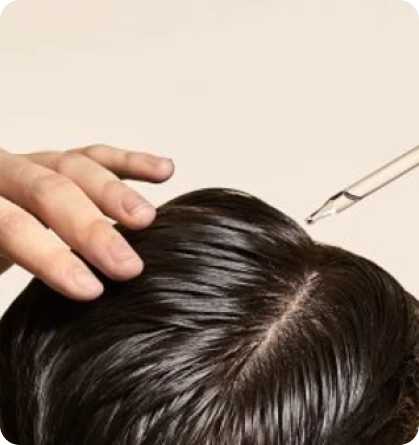
RU58841 VS FIn Comparison and Side effects
Share
This blog post will be discussing the Head to Head comparisons of RU58841 and Finasteride (Propecia) - WARNING LONG POST!!
This blog post will be discussing the Head to Head comparisons of RU58841 and Finasteride (Propecia) - WARNING LONG POST!! But worth the read if you are interested.
This Blog post will look at the benefits of both and comparing the advantages to RU over finasteride
We will also give an in-depth look at the side effects of both.
Hair loss treatments like finasteride (Propecia) and minoxidil (Rogaine) have been popular options for years. But a new contender called RU58841 is emerging as a potentially better alternative for regrowing hair.
In this post, we’ll compare the pros and cons of using RU58841 versus finasteride, including the latest scientific research on their effectiveness and potential side effects.
RU58841 Overview:
RU58841 is a topical anti-androgen that works by blocking androgen receptors in the scalp. This prevents testosterone and DHT from binding and damaging hair follicles, allowing them to recover.
It’s not an FDA-approved treatment yet, but is available as a research compound. Early studies show RU58841 regrows more hair than finasteride with fewer systemic effects.
Finasteride Overview:
Finasteride (brand name Propecia) is an oral medication that blocks the enzyme 5-alpha reductase, preventing conversion of testosterone to DHT. Lowering DHT helps shrink enlarged follicles to encourage new hair growth.
While effective, finasteride can cause sexual side effects and depression in some men due to lower DHT levels throughout the body.
Study Comparing RU58841 and Finasteride:
A recent 6-month study compared various doses of RU58841 to high-dose finasteride head-to-head in macaques, a species which experiences hair loss similarly to humans.
RU58841 increased active growing hairs by 103% compared to 88% for finasteride. RU58841 also matured 26% of vellus hairs vs only 12% for fin.
Researchers believe RU58841's localized action at the scalp accounts for its superior regrowth over finasteride.
Pros of Using RU58841:
-
More effective at regrowing hair than finasteride
-
Avoids systemic reduction of DHT
-
Lower risk of sexual side effects
-
Non-hormonal mechanism of action
-
Well tolerated in studies so far
Potential Side Effects:
-
Since RU58841 is still experimental, long-term safety data in humans is limited
-
Short-term side effects seem mild, including scalp itching/flaking
-
Systemic absorption and effects on hormones still being investigated
-
Possibility of eyelash/body hair growth if spread
In Depth Side effects
RU58841
Potential Side Effects:
-
Since RU58841 is still experimental, long-term safety data in humans is limited
-
Short-term side effects seem mild, including scalp itching/flaking
-
A small number of users have reported chest pain and shortness of breath, indicating possible cardiovascular effects
-
One case study found heart enlargement and EKG changes reversed upon stopping RU58841, suggesting users should monitor heart health
-
Systemic absorption and effects on hormones still being investigated
-
Possibility of eyelash/body hair growth if spread
-
Most side effects seem to resolve with discontinuation or dose reduction
The key risks to be aware of are potential cardiovascular effects like chest pain and shortness of breath. These seem rare but should be monitored closely. Stopping or lowering the RU58841 dose has caused side effects to reverse in some cases.
As with any experimental treatment, it's important to carefully weigh the pros and cons. Discuss using RU58841 with your doctor to determine if it is the right choice for your individual health and hair loss needs. Proper dosage and ongoing monitoring can help minimize adverse effects.
Topical Finasteride Side Effects
Applying finasteride directly to the scalp may lower systemic absorption and reduce the risk of side effects compared to oral finasteride. However, some absorption still occurs and side effects are possible, including:
-
Decreased libido - Topical finasteride may cause diminished sex drive in some men since DHT is reduced. However, topical absorption is lower than oral doses.
-
Erectile dysfunction - Difficulty achieving or maintaining erections can occur in a small percentage of topical finasteride users, likely due to lower DHT.
-
Breast enlargement and tenderness - Finasteride inhibits 5-alpha reductase in tissues besides the scalp, which can lead to gynecomastia in rare cases.
-
Mood changes - Some men notice depression or anxiety on finasteride, although controlled studies have found no difference. Individual reactions vary.
-
Skin reactions - Topical finasteride is applied directly to the scalp, increasing chances of localized skin irritation, itching, rash or swelling.
Oral Finasteride Side Effects
The most common side effects of oral finasteride include:
-
Decreased libido - Reported in 3-16% of men on finasteride. Effects reverse upon discontinuation.
-
Erectile dysfunction - Reported in 3-15% of men in studies. Reverses with drug cessation.
-
Ejaculation disorders - Decreased volume, trouble ejaculating, or reduced pleasure reported in 0.5-15% of users.
-
Gynecomastia - Breast enlargement and tenderness occurs in about 2% of men on finasteride. Usually goes away if treatment stopped.
-
Mood changes - Feelings of depression and anxiety have been reported. Controlled studies show no difference though.
The mechanism behind most finasteride side effects is the reduced DHT levels throughout the body from the oral dose inhibiting 5-alpha reductase systemically. Topical application can lower this risk. Discuss your concerns with your doctor to determine if finasteride is right for you.
Conclusion:
Early research shows RU58841 holds great promise as a topical DHT blocker for treating hair loss in both men and women. While more studies are still needed, RU58841 appears safer and more effective than traditional options like finasteride.
Talk to your dermatologist to see if adding RU58841 to your hair loss regimen may help regrow the thick, healthy hair you've been missing.


